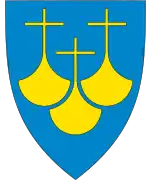Stordal Municipality
Stordal kommune | |
|---|---|
| Stordalen herred (historic name) | |
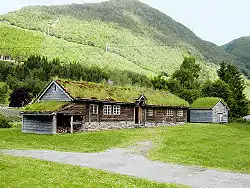 View of the Løsetstova in Stordal | |
 Flag | |
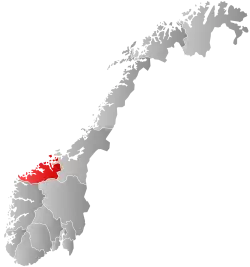 Møre og Romsdal within Norway | |
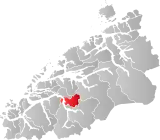 Stordal within Møre og Romsdal | |
| Coordinates: 62°23′24″N 07°06′38″E / 62.39000°N 7.11056°E | |
| Country | Norway |
| County | Møre og Romsdal |
| District | Sunnmøre |
| Established | 1 Jan 1892 |
| • Preceded by | Stranda Municipality |
| Disestablished | 1 Jan 1965 |
| • Succeeded by | Ørskog Municipality |
| Re-established | 1 Jan 1977 |
| • Preceded by | Ørskog Municipality |
| Disestablished | 1 Jan 2020 |
| • Succeeded by | Fjord Municipality |
| Administrative centre | Stordal |
| Government | |
| • Mayor (2015-2019) | Eva Hove (H) |
| Area (upon dissolution) | |
| • Total | 247.07 km2 (95.39 sq mi) |
| • Land | 243.63 km2 (94.07 sq mi) |
| • Water | 3.44 km2 (1.33 sq mi) 1.4% |
| • Rank | #306 in Norway |
| Population (2018) | |
| • Total | 972 |
| • Rank | #396 in Norway |
| • Density | 4/km2 (10/sq mi) |
| • Change (10 years) | |
| Demonym | Stordaling[1] |
| Official language | |
| • Norwegian form | Nynorsk |
| Time zone | UTC+01:00 (CET) |
| • Summer (DST) | UTC+02:00 (CEST) |
| ISO 3166 code | NO-1526[3] |
Stordal is a former municipality in Møre og Romsdal county, Norway. It merged with Norddal municipality to establish the new Fjord municipality in 2020. It was part of the Sunnmøre region. The administrative centre of the municipality was the village of Stordal. The historic farm and museum of Ytste Skotet lies along the Storfjorden in the western part of the municipality. Most of the municipality lies on the eastern side of the fjord.
Stordal had relatively good agricultural land, and the main source of income is livestock. Stordal has also been home to furniture production and continues with the industry today.[4]
At the time if its dissolution in 2020, the 247-square-kilometre (95 sq mi) municipality is the 306th largest by area out of the 422 municipalities in Norway. Stordal is the 396th most populous municipality in Norway with a population of 972. The municipality's population density is 4 inhabitants per square kilometre (10/sq mi) and its population has decreased by 0.7% over the last decade.[5][6]
General information

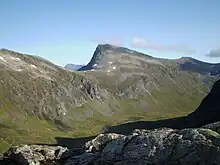

Stordal was established as a municipality on 1 January 1892 when it was separated from the large municipality of Stranda (to the southwest). The initial population of the municipality was 850. During the 1960s, there were many municipal mergers across Norway due to the work of the Schei Committee. On 1 January 1965, the three neighboring municipalities of Ørskog, Skodje, and Stordal were merged into one large Ørskog municipality. Prior to the merger, there were 1,052 inhabitants in Stordal. The merger, however, was short-lived, and on 1 January 1977 it was reversed and the three municipalities were once again separated.[7]
On 1 January 2020, the municipalities of Stordal (population: 972) and Norddal (population: 1,670) were merged into the new Fjord Municipality.[8]
Name
The municipality (originally the parish) is named after the local Stordalen valley (Old Norse: Stóladalr). The first element is the plural genitive case of stóll which means "chair" or "throne". The may be because two mountains located around the valley have the name Stolen (meaning "the chair"). The last element is dalr which means "valley" or "dale".[9] Historically, the name of the municipality was spelled Stordalen. On 3 November 1917, a royal resolution changed the spelling of the name of the municipality to Stordal, removing the definite form ending -en.[10]
Coat of arms
The coat of arms was granted on 30 August 1991 and they were in use until the municipality was dissolved on 1 January 2020. The official blazon is "Azure, a pale dovetailed Or" (Norwegian: På blå grunn ein gull stolpe laga med duestjertsnitt). This means the arms have a blue field (background) and the charge is a pale with dovetailed sides. The charge has a tincture of Or which means it is commonly colored yellow, but if it is made out of metal, then gold is used. The pale symbolises the forestry and furniture manufacturing in the municipality, which traditionally uses a dovetail system to join two pieces of wood. The same symbol also indicates the strong community feeling in the villages. The arms were designed by Jarle Skuseth. The municipal flag has the same design as the coat of arms.[11][12][13]
Churches
The Church of Norway had one parish with one church, within the municipality of Stordal. There is also the old church, Rosekyrkja, which is now a museum. It was part of the Austre Sunnmøre prosti (deanery) in the Diocese of Møre.
| Parish (sokn) | Church name | Location of the church | Year built |
|---|---|---|---|
| Stordal | Stordal Church | Stordal | 1907 |
| Old Stordal Church (Rosekyrkja)* | Stordal | 1789 | |
| *The Rosekyrkja has been a museum church since 1908. | |||
Geography
Stordal municipality was located along the inner Storfjorden in Sunnmøre. The majority of the municipality was located east of the fjord, while a small uninhabited mountainous area on the west side of the fjord was also part of Stordal. Ytste Skotet is a preserved historic farm/museum that is located on the steep mountainsides on the west side of the fjord. Most of the municipality surrounded the Stordalen valley on the east side of the fjord.[4]
The municipalities of Ørskog and Vestnes were located to the north of Stordal, Rauma was located to the east, Norddal and Stranda was located to the south, and Sykkylven was located to the west. The municipality was fairly isolated, with only two road connections to the outside world. Norwegian County Road 650 passed through the municipality from north to south, connecting it to Ørskog Municipality to the north and to Stranda Municipality to the south. Due to the mountainous landscape, the highway goes through the Dyrkorn Tunnel and Stordal Tunnel in the northern part of the municipality. The two tunnels are separated by the small village of Dyrkorn.[4]
Government
While it existed, this municipality was responsible for primary education (through 10th grade), outpatient health services, senior citizen services, unemployment, social services, zoning, economic development, and municipal roads. During its existence, this municipality was governed by a municipal council of directly elected representatives. The mayor was indirectly elected by a vote of the municipal council.[14] The municipality fell under the Sunnmøre District Court and the Frostating Court of Appeal.
Municipal council
The municipal council (Kommunestyre) of Stordal is made up of 15 representatives that are elected to four year terms. The party breakdown for the final municipal council was as follows:
| Party name (in Nynorsk) | Number of representatives | |
|---|---|---|
| Labour Party (Arbeidarpartiet) | 6 | |
| Progress Party (Framstegspartiet) | 1 | |
| Conservative Party (Høgre) | 5 | |
| Christian Democratic Party (Kristeleg Folkeparti) | 1 | |
| Centre Party (Senterpartiet) | 2 | |
| Total number of members: | 15 | |
| Party name (in Nynorsk) | Number of representatives | |
|---|---|---|
| Labour Party (Arbeidarpartiet) | 4 | |
| Progress Party (Framstegspartiet) | 1 | |
| Conservative Party (Høgre) | 7 | |
| Christian Democratic Party (Kristeleg Folkeparti) | 1 | |
| Centre Party (Senterpartiet) | 2 | |
| Total number of members: | 15 | |
| Party name (in Nynorsk) | Number of representatives | |
|---|---|---|
| Labour Party (Arbeidarpartiet) | 2 | |
| Progress Party (Framstegspartiet) | 2 | |
| Conservative Party (Høgre) | 7 | |
| Christian Democratic Party (Kristeleg Folkeparti) | 2 | |
| Centre Party (Senterpartiet) | 2 | |
| Total number of members: | 15 | |
| Party name (in Nynorsk) | Number of representatives | |
|---|---|---|
| Labour Party (Arbeidarpartiet) | 2 | |
| Progress Party (Framstegspartiet) | 2 | |
| Conservative Party (Høgre) | 7 | |
| Centre Party (Senterpartiet) | 4 | |
| Total number of members: | 15 | |
| Party name (in Nynorsk) | Number of representatives | |
|---|---|---|
| Labour Party (Arbeidarpartiet) | 4 | |
| Progress Party (Framstegspartiet) | 1 | |
| Conservative Party (Høgre) | 9 | |
| Christian Democratic Party (Kristeleg Folkeparti) | 2 | |
| Centre Party (Senterpartiet) | 3 | |
| Total number of members: | 19 | |
| Party name (in Nynorsk) | Number of representatives | |
|---|---|---|
| Labour Party (Arbeidarpartiet) | 4 | |
| Conservative Party (Høgre) | 8 | |
| Christian Democratic Party (Kristeleg Folkeparti) | 2 | |
| Centre Party (Senterpartiet) | 3 | |
| Liberal Party (Venstre) | 2 | |
| Total number of members: | 19 | |
| Party name (in Nynorsk) | Number of representatives | |
|---|---|---|
| Labour Party (Arbeidarpartiet) | 5 | |
| Conservative Party (Høgre) | 7 | |
| Centre Party (Senterpartiet) | 6 | |
| Liberal Party (Venstre) | 1 | |
| Total number of members: | 19 | |
| Party name (in Nynorsk) | Number of representatives | |
|---|---|---|
| Labour Party (Arbeidarpartiet) | 5 | |
| Conservative Party (Høgre) | 4 | |
| Christian Democratic Party (Kristeleg Folkeparti) | 3 | |
| Centre Party (Senterpartiet) | 5 | |
| Liberal Party (Venstre) | 2 | |
| Total number of members: | 19 | |
| Party name (in Nynorsk) | Number of representatives | |
|---|---|---|
| Labour Party (Arbeidarpartiet) | 6 | |
| Conservative Party (Høgre) | 4 | |
| Christian Democratic Party (Kristeleg Folkeparti) | 3 | |
| Centre Party (Senterpartiet) | 4 | |
| Liberal Party (Venstre) | 2 | |
| Total number of members: | 19 | |
| Party name (in Nynorsk) | Number of representatives | |
|---|---|---|
| Labour Party (Arbeidarpartiet) | 4 | |
| Conservative Party (Høgre) | 5 | |
| Christian Democratic Party (Kristeleg Folkeparti) | 3 | |
| Centre Party (Senterpartiet) | 5 | |
| Liberal Party (Venstre) | 2 | |
| Total number of members: | 19 | |
| Party name (in Nynorsk) | Number of representatives | |
|---|---|---|
| Christian Democratic Party (Kristeleg Folkeparti) | 3 | |
| Centre Party (Senterpartiet) | 4 | |
| Local List(s) (Lokale lister) | 6 | |
| Total number of members: | 13 | |
| Party name (in Nynorsk) | Number of representatives | |
|---|---|---|
| Labour Party (Arbeidarpartiet) | 2 | |
| Christian Democratic Party (Kristeleg Folkeparti) | 3 | |
| Centre Party (Senterpartiet) | 3 | |
| Local List(s) (Lokale lister) | 5 | |
| Total number of members: | 13 | |
| Party name (in Nynorsk) | Number of representatives | |
|---|---|---|
| Labour Party (Arbeidarpartiet) | 2 | |
| Farmers' Party (Bondepartiet) | 5 | |
| Joint List(s) of Non-Socialist Parties (Borgarlege Felleslister) | 6 | |
| Total number of members: | 13 | |
| Party name (in Nynorsk) | Number of representatives | |
|---|---|---|
| Local List(s) (Lokale lister) | 12 | |
| Total number of members: | 12 | |
| Party name (in Nynorsk) | Number of representatives | |
|---|---|---|
| Local List(s) (Lokale lister) | 12 | |
| Total number of members: | 12 | |
| Party name (in Nynorsk) | Number of representatives | |
|---|---|---|
| Local List(s) (Lokale lister) | 12 | |
| Total number of members: | 12 | |
| Party name (in Nynorsk) | Number of representatives | |
|---|---|---|
| Local List(s) (Lokale lister) | 12 | |
| Total number of members: | 12 | |
| Note: Due to the German occupation of Norway during World War II, no elections were held for new municipal councils until after the war ended in 1945. | ||
Mayors
- 1892–1910: Lars Martinussen Kirkebøe (V)
- 1911–1919: Knut Johansen Hove
- 1920–1941: Ole Iversen Rødset (Bp)
- 1941–1943: Jens O. Moe (NS)
- 1943–1944: Ole Nygård (NS)
- 1944–1945: Peter Th. Moe (NS)
- 1945–1945: Jakob P. Hove (NS)
- 1945–1945: Ole Iversen Rødset
- 1946–1951: Jakob P. Hove
- 1952–1955: Knut Stavseng
- 1956–1957: Jacob Hove
- 1958–1961: Johan Lianes
- 1962–1964: Severin Flåen
(1965–1976: part of Ørskog Municipality)
Settlers in Iceland
Some people from Stordal settled in Iceland and used Stordal as their last name. The Stordal family is quite known in Iceland but the siblings Sigurður Kristinn Stórdal and Lovísa Stórdal are the most known well-known Stordals currently alive. They are descendants of Egill "Sterki" Stórdal and Ásgerður "Fagra" Stórdal. Egill and his wife became farmers in Stordal which is now known as Skorradalur in Borgarfjörður, Iceland.
See also
References
- ↑ "Navn på steder og personer: Innbyggjarnamn" (in Norwegian). Språkrådet.
- ↑ "Forskrift om målvedtak i kommunar og fylkeskommunar" (in Norwegian). Lovdata.no.
- ↑ Bolstad, Erik; Thorsnæs, Geir, eds. (26 January 2023). "Kommunenummer". Store norske leksikon (in Norwegian). Kunnskapsforlaget.
- 1 2 3 Store norske leksikon. "Stordal" (in Norwegian). Retrieved 21 June 2013.
- ↑ Statistisk sentralbyrå (2018). "Table: 06913: Population 1 January and population changes during the calendar year (M)" (in Norwegian). Retrieved 18 August 2019.
- ↑ Statistisk sentralbyrå. "09280: Area of land and fresh water (km²) (M)" (in Norwegian). Retrieved 18 August 2019.
- ↑ Jukvam, Dag (1999). Historisk oversikt over endringer i kommune- og fylkesinndelingen (PDF) (in Norwegian). Statistisk sentralbyrå. ISBN 9788253746845.
- ↑ Siverstøl, Anette (9 August 2017). "Stordal og Norddal blir truleg Fjord kommune". Sunnmørsposten (in Norwegian). Retrieved 19 October 2017.
- ↑ Rygh, Oluf (1908). Norske gaardnavne: Romsdals amt (in Norwegian) (13 ed.). Kristiania, Norge: W. C. Fabritius & sønners bogtrikkeri. p. 134.
- ↑ "Norsk Lovtidende. 2den Afdeling. 1917. Samling af Love, Resolutioner m.m". Norsk Lovtidend (in Norwegian). Kristiania, Norge: Grøndahl og Søns Boktrykkeri: 1057–1065. 1917.
- ↑ "Civic heraldry of Norway - Norske Kommunevåpen". Heraldry of the World. Retrieved 5 April 2023.
- ↑ "Stordal, Møre og Romsdal". Flags of the World. Retrieved 5 April 2023.
- ↑ "Godkjenning av våpen og flagg". Lovdata.no (in Norwegian). Norges kommunal- og arbeidsdepartementet. 30 August 1991. Retrieved 5 April 2023.
- ↑ Hansen, Tore; Vabo, Signy Irene, eds. (20 September 2022). "kommunestyre". Store norske leksikon (in Norwegian). Kunnskapsforlaget. Retrieved 1 January 2023.
- 1 2 3 4 "Table: 04813: Members of the local councils, by party/electoral list at the Municipal Council election (M)" (in Norwegian). Statistics Norway.
- ↑ "Tall for Norge: Kommunestyrevalg 2011 - Møre og Romsdal" (in Norwegian). Statistics Norway. Retrieved 19 October 2019.
- ↑ "Kommunestyrevalget 1995" (PDF) (in Norwegian). Oslo-Kongsvinger: Statistisk sentralbyrå. 1996. Retrieved 26 April 2020.
- ↑ "Kommunestyrevalget 1991" (PDF) (in Norwegian). Oslo-Kongsvinger: Statistisk sentralbyrå. 1993. Retrieved 26 April 2020.
- ↑ "Kommunestyrevalget 1987" (PDF) (in Norwegian). Oslo-Kongsvinger: Statistisk sentralbyrå. 1988. Retrieved 26 April 2020.
- ↑ "Kommunestyrevalget 1983" (PDF) (in Norwegian). Oslo-Kongsvinger: Statistisk sentralbyrå. 1984. Retrieved 26 April 2020.
- ↑ "Kommunestyrevalget 1979" (PDF) (in Norwegian). Oslo: Statistisk sentralbyrå. 1979. Retrieved 26 April 2020.
- ↑ "Kommunevalgene 1963" (PDF) (in Norwegian). Oslo: Statistisk sentralbyrå. 1964. Retrieved 26 April 2020.
- ↑ "Kommunevalgene og Ordførervalgene 1959" (PDF) (in Norwegian). Oslo: Statistisk sentralbyrå. 1960. Retrieved 26 April 2020.
- ↑ "Kommunevalgene og Ordførervalgene 1955" (PDF) (in Norwegian). Oslo: Statistisk sentralbyrå. 1957. Retrieved 26 April 2020.
- ↑ "Kommunevalgene og Ordførervalgene 1951" (PDF) (in Norwegian). Oslo: Statistisk sentralbyrå. 1952. Retrieved 26 April 2020.
- ↑ "Kommunevalgene og Ordførervalgene 1947" (PDF) (in Norwegian). Oslo: Statistisk sentralbyrå. 1948. Retrieved 26 April 2020.
- ↑ "Kommunevalgene og Ordførervalgene 1945" (PDF) (in Norwegian). Oslo: Statistisk sentralbyrå. 1947. Retrieved 26 April 2020.
- ↑ "Kommunevalgene og Ordførervalgene 1937" (PDF) (in Norwegian). Oslo: Statistisk sentralbyrå. 1938. Retrieved 26 April 2020.
- ↑ Sande, Jostein (1992). Stordal 1892–1992 (in Norwegian). Stordal kommune.
External links
 Media related to Stordal at Wikimedia Commons
Media related to Stordal at Wikimedia Commons Møre og Romsdal travel guide from Wikivoyage
Møre og Romsdal travel guide from Wikivoyage

